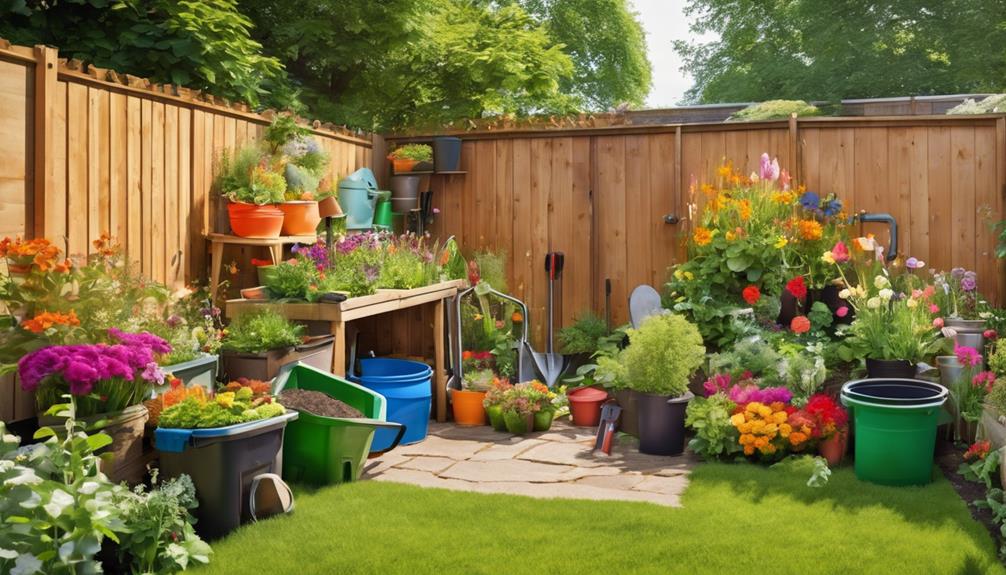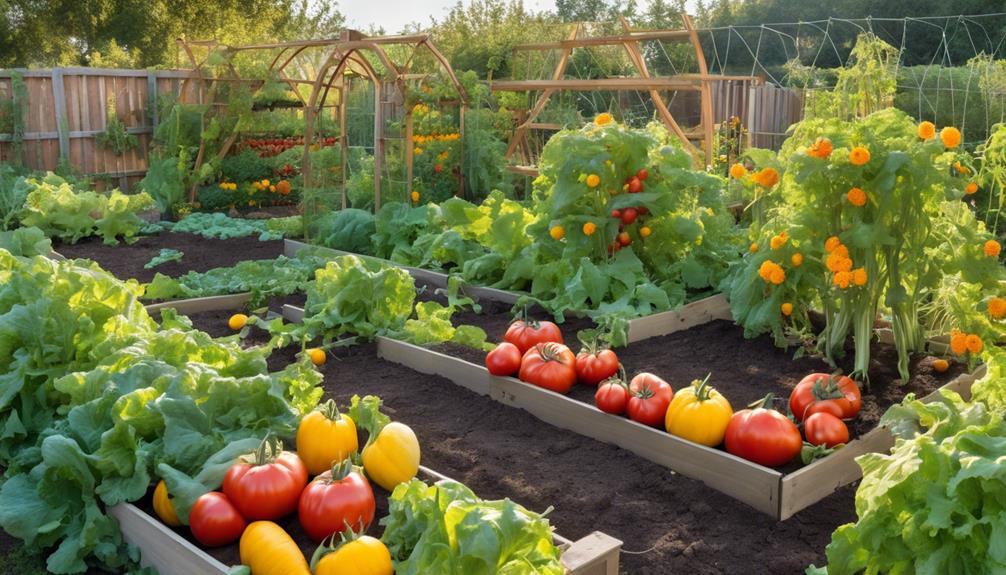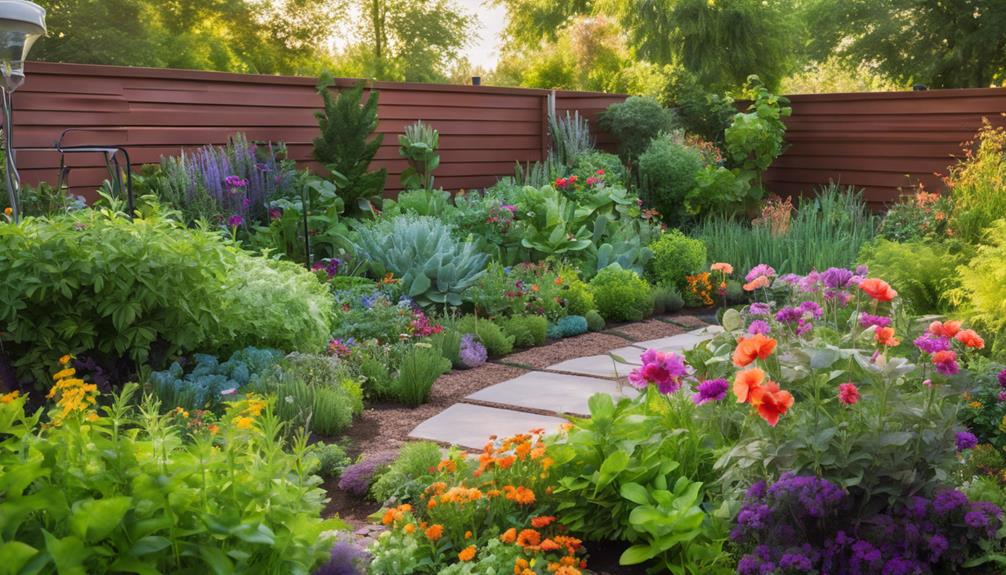
Top Reasons to Hire Professional Garden Maintenance
1 October 2024
What Are Simple DIY Garden Maintenance Tips?
1 October 2024DIY garden maintenance is essential for homeowners as it provides cost-effective solutions, promotes environmental stewardship, and enhances personal satisfaction.
By managing their gardens, homeowners can significantly reduce landscaping costs while cultivating a deeper appreciation for nature. This approach encourages sustainable practices such as composting and rainwater harvesting, leading to healthier soils and improved plant health.
Furthermore, hands-on involvement fosters a sense of responsibility towards local biodiversity and community well-being. Embracing DIY gardening not only enriches personal spaces but also contributes positively to the environment.
Explore how these practices can further transform your gardening experience.
Importance of DIY Gardening
DIY gardening offers cost-effective solutions for maintaining green spaces, allowing individuals to save money while cultivating their gardens.
Engaging in this hands-on approach fosters a deeper personal connection to nature, enhancing overall well-being and appreciation for the environment.
Cost-Effective Solutions
Gardening enthusiasts often find that embracing a do-it-yourself approach not only enhances their skills but also significantly reduces costs.
By opting for DIY garden maintenance, homeowners can eliminate the expenses associated with professional landscaping services. This autonomy allows for strategic budgeting, enabling the allocation of funds towards high-quality seeds, tools, and organic fertilisers.
Moreover, cultivating your own plants reduces dependence on commercially purchased flora, which often carries a premium price tag. Implementing sustainable practices, such as composting and rainwater harvesting, further boosts cost savings while promoting environmental stewardship.
Ultimately, mastering DIY gardening not only fosters economic efficiency but also empowers individuals to create thriving, personalised green spaces that reflect their unique vision and values.
Personal Connection to Nature
Engaging in garden maintenance fosters a profound personal connection to nature, allowing individuals to cultivate a deeper appreciation for their environment.
This hands-on involvement not only enhances one's understanding of ecological systems but also instils a sense of responsibility towards preserving local biodiversity. By tending to plants, homeowners witness the intricate cycles of growth, decay, and renewal, fostering respect for natural processes.
In addition, the tactile experience of soil, the fragrance of blooms, and the vibrant colours stimulate the senses, creating a sanctuary that nurtures mental well-being.
As individuals nurture their gardens, they forge an emotional bond with the land, transforming mere spaces into living ecosystems.
Ultimately, this connection enriches both personal fulfilment and environmental stewardship, making DIY gardening an invaluable practice.
Soil Quality and Preparation
Soil quality is a vital factor in successful gardening, as it directly influences plant health and productivity.
Achieving a balanced nutrient profile, incorporating organic matter, and adjusting pH levels are crucial techniques for ideal soil preparation.
Nutrient Balance in Soil
Achieving a proper nutrient balance in soil is critical for promoting healthy plant growth and maximising yield. Understanding the necessary nutrients and their roles enables homeowners to effectively prepare their gardens for success.
Three primary macronutrients must be considered:
- Nitrogen (N): Integral for leaf growth and comprehensive plant vigour, nitrogen supports photosynthesis and protein synthesis.
- Phosphorus (P): Key for root development and flowering, phosphorus improves energy transfer and genetic material development.
- Potassium (K): Important for water regulation and disease resistance, potassium boosts plant resilience and overall health.
Regular soil testing and amendments based on these nutrients guarantee that your garden maintains an ideal nutrient balance, fostering robust growth and prolific yields.
Mastery of soil nutrition is fundamental to thriving garden ecosystems.
Organic Matter Incorporation
Incorporating organic matter into garden soil is vital for enhancing soil quality and promoting optimal plant growth. Organic matter enriches the soil, improves its structure, and fosters a thriving ecosystem of beneficial organisms.
To achieve ideal results, consider the following important practices:
- Composting: Utilise kitchen scraps and garden waste to create nutrient-rich compost, returning essential nutrients to the soil.
- Mulching: Apply organic mulch, such as wood chips or straw, to maintain moisture levels and suppress weeds while gradually breaking down to enrich the soil.
- Cover Cropping: Plant cover crops during the off-season to improve soil structure, increase organic matter, and prevent erosion.
Ph Level Adjustment Techniques
Maintaining the proper pH level in garden soil is vital for ensuring optimal nutrient availability and promoting healthy plant growth.
Soil pH directly influences the solubility of essential nutrients, making it imperative for homeowners to regularly assess and adjust levels as necessary.
Here are three effective techniques for pH adjustment:
- Lime Application: To raise soil pH, incorporate powdered limestone, a slow-acting amendment that effectively neutralises acidity.
- Sulphur Addition: For lowering soil pH, elemental sulphur is a reliable choice, as it oxidises to form sulphuric acid, gradually acidifying the soil.
- Organic Matter: Regularly adding compost or well-rotted manure can naturally balance pH while improving soil structure and fertility.
Implementing these techniques will enhance soil quality and promote optimal plant health.
Soil Testing Techniques
Effective soil testing techniques are essential for understanding and enhancing soil health.
By gathering the necessary tools, gardeners can accurately assess soil conditions, which in turn informs appropriate watering techniques and companion planting strategies.
This foundational knowledge empowers gardeners to create thriving ecosystems that support plant growth and sustainability.
Gather Necessary Soil Testing Tools
To achieve optimal garden health, gathering the necessary soil testing tools is essential.
Accurate soil analysis enables homeowners to make informed decisions regarding nutrient management, pH balance, and overall soil fertility.
Here are three fundamental tools to consider:
- Soil Test Kit: A comprehensive kit allows you to measure pH, nitrogen, phosphorus, and potassium levels, providing insights into soil composition and fertility.
- Soil Moisture Meter: This device helps assess moisture levels, ensuring that you maintain optimal watering practices for plant health.
- Trowel: A sturdy trowel is important for collecting soil samples from various depths and locations, which is necessary for a thorough analysis.
Equipping yourself with these tools ensures a proactive approach to soil management, fostering a thriving garden ecosystem.
Watering Techniques for Soil Health
Implementing appropriate watering techniques is crucial for enhancing soil health and supporting plant vigour. Mastering these methods ensures that your garden flourishes while maintaining optimal moisture levels for root development.
Consider the following techniques to improve your watering practices:
- Deep Watering: Encourage roots to grow deeper by applying water slowly and allowing it to penetrate the soil, effectively reaching the root zone.
- Timing: Water early in the morning or late in the evening to minimise evaporation, ensuring that more moisture reaches the soil rather than being lost to the atmosphere.
- Soil Moisture Monitoring: Regularly test soil moisture levels to avoid over- or under-watering, promoting an ideal environment for beneficial microorganisms and comprehensive soil health.
Companion Planting Strategies
Companion planting offers a creative approach to improving garden health and productivity by strategically pairing plants that benefit one another.
This method can lead to better pest control, optimised space utilisation, and improved soil health. To effectively implement companion planting strategies, consider the following:
- Pest Management: Certain plants, such as marigolds, deter harmful insects, thereby protecting neighbouring crops.
- Nutrient Sharing: Deep-rooted plants, like tomatoes, can access nutrients that are unavailable to shallow-rooted companions such as lettuce, promoting a balanced ecosystem.
- Symbiotic Relationships: Legumes, such as beans, fix nitrogen in the soil, benefiting nearby plants that require this essential nutrient.
Cost Savings on Maintenance
Maintaining a garden can often feel like an expensive endeavour, but strategic planning and DIY approaches can significantly reduce costs. By embracing a hands-on attitude, homeowners can save considerably on labour and materials. The following table illustrates potential savings through various DIY strategies:
| DIY Method | Estimated Savings |
|---|---|
| Composting organic waste | £50 – £100/year |
| Seed propagation | £30 – £60/year |
| Homemade pest solutions | £20 – £40/year |
| Mulching with local materials | £25 – £50/year |
Implementing these methods not only cuts expenses but also fosters a deeper connection to the garden. By mastering these techniques, homeowners can cultivate a flourishing garden while ensuring financial prudence.
Organic Pest Control Methods
Organic pest control methods are vital for maintaining a healthy garden ecosystem.
Techniques such as using neem oil and homemade insecticidal soap can effectively manage pests while minimising chemical residues.
Furthermore, understanding the best timing for application is important to enhance their effectiveness and protect beneficial insects.
Neem Oil for Pest Control
As gardeners increasingly seek effective and environmentally friendly solutions for pest management, neem oil has emerged as a powerful ally in the battle against unwanted insects.
Derived from the seeds of the neem tree, this natural pesticide disrupts the life cycle of pests while remaining safe for beneficial insects when applied correctly.
Here are three critical benefits of neem oil for pest control:
- Broad-Spectrum Efficacy: Neem oil targets a variety of pests, including aphids, spider mites, and whiteflies.
- Growth Regulator: It interferes with insect hormone systems, preventing larvae from maturing and reproducing.
- Fungal Resistance: Neem oil also combats fungal diseases, enhancing overall plant health.
Homemade Insecticidal Soap Application
Homemade insecticidal soap is an effective and straightforward solution for controlling pests in the garden. This organic method utilises the natural properties of soap to suffocate soft-bodied insects, such as aphids and spider mites, while remaining safe for beneficial organisms.
To guarantee ideal results, consider the following steps:
- Choose the Right Soap: Use a pure, biodegradable liquid soap, avoiding detergents and anti-bacterial agents that can harm plants.
- Create the Mixture: Combine 1-2 tablespoons of soap with 1 quart of water, ensuring thorough mixing for even application.
- Test on a Small Area: Before widespread application, test the mixture on a small part of the plant to prevent potential damage.
This method empowers homeowners to maintain healthy gardens sustainably.
Essential Timing for Application
Timing plays a crucial role in the effectiveness of pest control methods in the garden. Properly timed applications can greatly improve the efficacy of organic solutions, ensuring pests are targeted at their most vulnerable stages.
Here are three key timings to take into account:
- Early Morning or Late Evening: Applying treatments during the cooler parts of the day minimises evaporation and optimises absorption by plant tissues.
- Before Pest Lifecycle Peaks: Monitor pest activity and apply treatments just before population surges, ideally during larval or juvenile stages for optimal impact.
- Post-Rain or Watering: Ensure that the foliage is dry, but consider applying after rain when pests are still active and before they can hide or reproduce.
Mastering these timings will enhance your pest control strategy and promote a healthier garden ecosystem.
Pest Infestations and Management
Effective management of pest infestations requires a thorough approach that includes addressing environmental factors such as overwatering and drainage.
Implementing proper weed control techniques can also reduce competition for resources, thereby promoting healthier plants that are more resilient to pests.
Furthermore, mulching contributes to moisture retention, creating an ideal growing environment that minimises pest attraction.
Overwatering and Drainage Solutions
Overwatering can lead to significant issues in your garden, including pest infestations that thrive in overly damp environments.
To combat these problems effectively, implementing proper drainage solutions is crucial. Here are three key strategies:
- Soil Assessment: Regularly evaluate your soil's texture and structure to ensure adequate drainage capabilities. Amending soil with organic matter can enhance its ability to retain moisture without becoming waterlogged.
- Proper Plant Spacing: Allow sufficient space between plants to promote air circulation, reducing humidity levels that attract pests.
- Install Drainage Systems: Consider installing French drains or raised beds to direct excess water away from root zones, minimising standing water and discouraging pest populations.
Weed Control Techniques
Maintaining a healthy garden ecosystem requires vigilance not only against overwatering but also against the encroachment of weeds, which can exacerbate pest infestations by competing for nutrients and space.
Effective weed control techniques are crucial for promoting plant health and minimising pest problems. Here are three strategies to consider:
- Hand Pulling: Regularly inspect your garden and remove weeds by hand, ensuring to extract the roots to prevent regrowth.
- Herbicide Application: Utilise targeted herbicides that specifically address the weed species present, taking care to follow label instructions for safety and efficacy.
- Crop Rotation: Change the planting layout annually to disrupt weed growth cycles and reduce their ability to establish in your garden.
Mulching for Moisture Retention
A well-chosen layer of mulch can significantly enhance moisture retention in your garden while concurrently deterring pest infestations.
By creating a protective barrier, mulch conserves soil moisture and reduces the need for frequent watering, which is essential for plant health.
Consider these key benefits when mulching:
- Temperature Regulation: Mulch helps maintain a consistent soil temperature, fostering ideal root growth and reducing stress on plants.
- Weed Suppression: A thick layer of mulch inhibits weed growth, which can harbour pests and compete for nutrients.
- Habitat for Beneficial Organisms: Organic mulches attract beneficial insects and microorganisms that naturally control pest populations.
Incorporating mulching techniques into your garden maintenance strategy not only improves plant health but also minimises pest-related challenges.
Why Choose TKL Birmingham Gardener
When considering your garden's health and aesthetics, TKL Birmingham Gardener stands out as a premier choice for local gardening services.
This esteemed company combines horticultural expertise with a deep understanding of the local ecosystem, ensuring that each garden thrives in harmony with its environment.
Their skilled team employs sustainable practices, offering tailored solutions that enhance both the beauty and functionality of your outdoor space.
Whether you require precise lawn care, innovative landscaping, or seasonal maintenance, TKL Birmingham Gardener delivers exceptional quality and attention to detail.
Their commitment to customer satisfaction is evident through personalised consultations and ongoing support, empowering homeowners to achieve their gardening aspirations.
Elevate your garden experience by choosing TKL Birmingham Gardener for unparalleled service and expertise.
Common Gardening Mistakes to Avoid
Even the most enthusiastic gardeners can fall into common pitfalls that hinder their efforts and diminish the beauty of their outdoor spaces.
One prevalent mistake is overwatering, which can lead to root rot and fungal diseases; understanding the specific needs of each plant is essential.
Additionally, neglecting soil health often results in poor growth, so regular testing and amendment are significant.
Another common error is planting too closely, which can inhibit airflow and lead to competition for nutrients.
Moreover, ignoring seasonal changes can disrupt plant cycles, resulting in suboptimal performance.
Finally, failing to prune correctly can cause overgrowth and disease.
Future Gardening Workshops Offered
With a growing interest in sustainable gardening practices, local communities are increasingly offering a variety of workshops designed to enhance gardening skills and knowledge.
These workshops serve as invaluable resources for homeowners seeking to refine their gardening expertise and promote environmental stewardship.
- Compost Creation: Learn the principles of composting to enrich soil health and reduce waste.
- Native Plant Selection: Discover the benefits of incorporating native plants into your garden for biodiversity and resilience.
- Pest Management Techniques: Master integrated pest management strategies to maintain a flourishing garden ecosystem.
Participating in these workshops not only cultivates practical skills but also fosters a sense of community among gardeners, reinforcing the importance of shared knowledge in achieving horticultural mastery.




